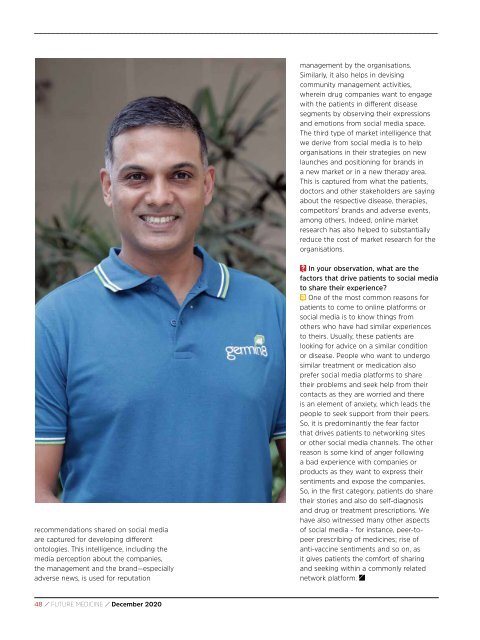You also want an ePaper? Increase the reach of your titles
YUMPU automatically turns print PDFs into web optimized ePapers that Google loves.
management by the organisations.<br />
Similarly, it also helps in devising<br />
community management activities,<br />
wherein drug companies want to engage<br />
with the patients in different disease<br />
segments by observing their expressions<br />
and emotions from social media space.<br />
The third type of market intelligence that<br />
we derive from social media is to help<br />
organisations in their strategies on new<br />
launches and positioning for brands in<br />
a new market or in a new therapy area.<br />
This is captured from what the patients,<br />
doctors and other stakeholders are saying<br />
about the respective disease, therapies,<br />
competitors’ brands and adverse events,<br />
among others. Indeed, online market<br />
research has also helped to substantially<br />
reduce the cost of market research for the<br />
organisations.<br />
recommendations shared on social media<br />
are captured for developing different<br />
ontologies. This intelligence, including the<br />
media perception about the companies,<br />
the management and the brand—especially<br />
adverse news, is used for reputation<br />
In your observation, what are the<br />
factors that drive patients to social media<br />
to share their experience?<br />
One of the most common reasons for<br />
patients to come to online platforms or<br />
social media is to know things from<br />
others who have had similar experiences<br />
to theirs. Usually, these patients are<br />
looking for advice on a similar condition<br />
or disease. People who want to undergo<br />
similar treatment or medication also<br />
prefer social media platforms to share<br />
their problems and seek help from their<br />
contacts as they are worried and there<br />
is an element of anxiety, which leads the<br />
people to seek support from their peers.<br />
So, it is predominantly the fear factor<br />
that drives patients to networking sites<br />
or other social media channels. The other<br />
reason is some kind of anger following<br />
a bad experience with companies or<br />
products as they want to express their<br />
sentiments and expose the companies.<br />
So, in the first category, patients do share<br />
their stories and also do self-diagnosis<br />
and drug or treatment prescriptions. We<br />
have also witnessed many other aspects<br />
of social media - for instance, peer-topeer<br />
prescribing of medicines; rise of<br />
anti-vaccine sentiments and so on, as<br />
it gives patients the comfort of sharing<br />
and seeking within a commonly related<br />
network platform.<br />
48 / FUTURE MEDICINE / <strong>December</strong> <strong>2020</strong>

















